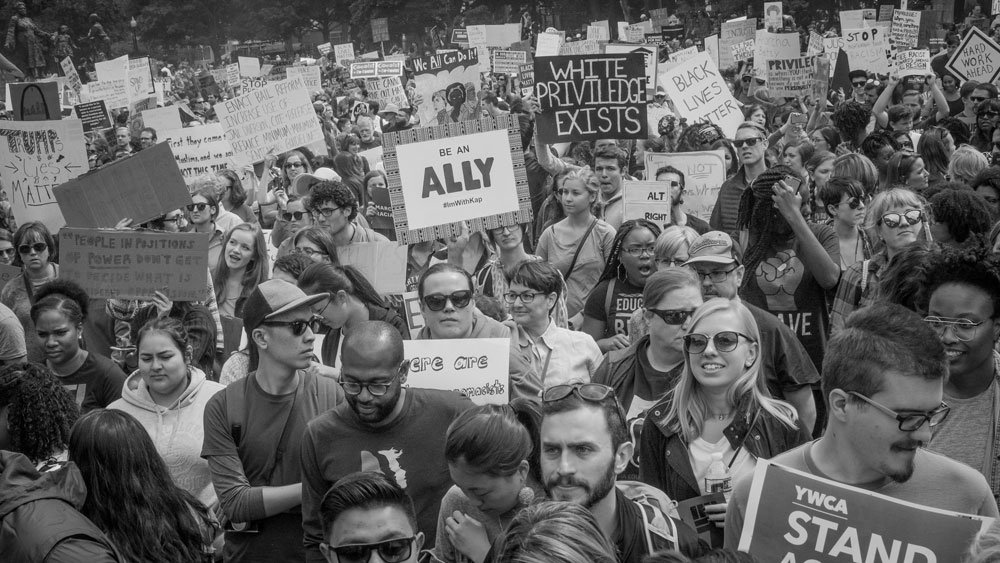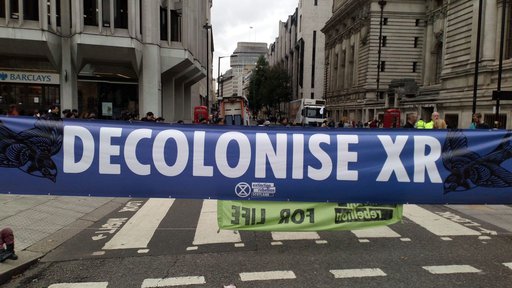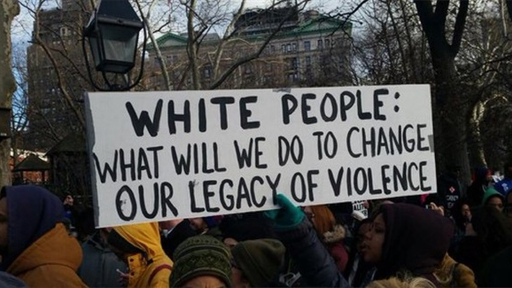
The path to justice in the struggle for a livable future
Decolonization, allyship and self-reflection
The global systemic crises are becoming increasingly apparent. Around the world, animal and plant species, cultures, and ecosystems are disappearing irreversibly: a double burden for those who have contributed least to the crises. People in the Global South, people affected by the consequences of centuries of exploitation, racism and many other forms of discrimination bear the consequences of our actions and proposed solutions. This enormous injustice is the continuation of a development that began long ago with colonization and continues today's industrial civilizations' oppression.
The echoes of European colonialism are catching up, connecting us in a global web of exploitation, but also of resistance.
First step: recognizing one's position in a racist-oppressive system
As activists, many want to work for a better world. More just. More ecological. More solidary. More life-friendly. But how do we get there?
Will the solutions currently discussed in Europe, and in some cases already being implemented, lead to just changes? Can these solutions even stop, or even reverse, the destruction of life on this scale? Precisely because of all the urgency, should we pause and ask ourselves: are we on the right track? Can we achieve these goals with the same thinking and actions that got us into this situation?
We know that our answers alone are insufficient to respond to all these questions. Therefore, at the beginning of this campaign, we critically analyze and question our understanding, inner attitude and approach.
Decolonization of thought

Who and what is "we"? What are our relationships to each other, to the land, waters, flora and fauna? How can we achieve genuinely just ecological and social change together? What does solidarity mean to those who have been fighting for their livelihoods and defending them against destruction for generations? And are we all "in the same boat," as is often falsely claimed in the European climate debate.
Colonial predation began many centuries ago and continues today. It manifests itself in global injustice promoted by politics, economic systems that justify unequal distribution of resources, or violent industries that put profits before lives.
But decolonization of the mind means much more than overcoming these injustices - it means questioning the dominance of Western ideas, values, and ways of acting, e.g. in terms of "development", "progress", "nature", or "knowledge".
As climate and environmental activists in the Global North, it also means to question our basic assumptions about our relationships and, for example, to facilitate constructive mutual learning moments with indigenous people. We should not (again) put our interests in the foreground, but organize the cooperation in a way that is meaningful for Indigenous people. If we don't know how to do this, we probably don't understand our existing relationship well enough.
Becoming effective allies and accomplices - making people aware of their privileges and undermining them

Decolonization is not just another aspect of social justice. Instead, it requires dismantling sites of colonialism, for example, by redistributing resources or returning lands to Indigenous people. What does it mean to become "good allies" of BIPoC and other marginalized people? Is this even enough or should we strive to be "accomplices" - to leave our comfort and take risks? What does it mean to share one's privileges, skills, and resources without portraying ourselves as saviours and patronizing others? What can we do concretely to eradicate structural racism and colonialism in different areas of life, such as in our movements?
In countries of the Global North, especially the white people there, benefit from historical colonization through our wealth and other visible and invisible privileges. White climate activists should be aware of this and actively work to dismantle these injustices.
Listening instead of patronizing
It is long overdue to listen with respect to people who, for example, have lived in close connection with their land for many generations. This approach means to actively listen to the many BIPoC activists in the Global South, and those in the Global North who have been questioning and overcoming power relations for a long time. Admitting that one's knowledge is limited and (un)learning with these people's knowledge and worldviews is one of many steps on the path to decolonize thinking. Especially privileged people in the global North are responsible for supporting decolonization processes without appropriating or dominating them.
The dystopia of colonialism is not only revealed by the climate crisis. It has been destroying livelihoods and cultures worldwide for generations. Thanks to colonized people's resistance and survival, self-determination has been maintained or regained in many places. Privileged people should look at ways to support this resistance based on the guidance of those affected, rather than imposing allegedly superior solutions on the whole world.
The decolonization of thought and action is a long process that is far from complete. It is inevitable to make mistakes on the way. But it is our responsibility within colonial societies to follow the people who have been on the way to a decolonized future for a long time!
*BIPoC stands for Black, Indigenous, People of Color - political self-designation of people who experience racism. This designation refers to the resistance experiences of Black, Indigenous, and other People of the Color and their fights for self-determination
Sources
We would like to share the materials collected on this page in a spirit of support and solidarity.
As a small group, we unfortunately do not have the capacity to research all the contacts and contact the authors, creators and contributors of the materials listed on this page and to ask them explicitly for their permission, to be linked in this context.
If you are the author, creator, or contributor of any of these materials of any of these materials and do not consent to their use in this context, please let us know at presse(at)extinctionrebellion.de and we will remove it.
Videos/Podcasts
Decolonization Is for Everyone - Nikki Sanchez
“This history is not your fault, but it is absolutely your responsibility.” A history of colonization exists and persists all around us. Nikki discusses what colonization looks like and how it can be addressed through decolonization. An equitable and just future depends on the courage we show today. “Let’s make our grandchildren proud”.
Deepen Your Understanding of Decolonisation - Samantha Moyo
Olivia U. Rutazibwa - Decoloniser
Pedagogy of the Decolonizing - Quetzala Carson
For the Wild Podcast: KYLE WHYTE on the Colonial Genesis of Climate Change
"No White Saviors is an advocacy campaign lead by a majority female, majority African team of professionals based in Kampala, Uganda. Our collective experience in the development & the aid sector has lead us to a deep commitment to seeing things change in a more equitable & anti-racist direction."
That's Not How That Works Podcast: Let's Cut the BS: From Ally to Accomplice
"In this episode, we talk about the journey from Ally to Accomplice. We define performative allyship, and why its a problem, and explore the pathway that someone must travel in order to be in full partnership and support of people of color."
That's Not How That Works Podcast: White Saviorism - Final Answer
"You might be a white savior if… Seriously y’all… we get questions about this one on the daily. “Am I a white savior? What are people gonna think of me if I share online about the work I’m doing? How do I make sure I’m not crossing the line into white saviorism?” So on today’s episode, Trudi and Weeze are sharing our FINAL ANSWER on this one. We’re exploring all about white saviorism: what it is, why it’s so dangerous, the difference between white identity and whiteness, and how to make sure you don’t show up in spaces as a white savior."
CBC, What does decolonization mean?
Decolonial Futures Collective - The house of modernity
Larry Lohman - Is white innocence holding back climate movements?
Articles:
Medium, Stuart Basden: Extinction Rebellion isn’t about the Climate
One of the co-founders of XR on the different dilusions of the system that created the climate crisis as a symptom: white-supremacy, patriarchy Eurocentrism, hetero-sexism/heteronormativity, class hierarchy
yes! magazine, Kyle Powys Whyte: White Allies, Let’s Be Honest About Decolonization
Pitfalls in allyship, romantic approach and "same-boat" approach. "Decolonizing allyship requires allies to be critical about their environmental realities — and about the purpose of their environmentalism"
Land Needs Guardians: How to Be an Ally of Indigenous-led Conservation
some perspective on how Indigenous and non-Indigenous people can work together in a new approach to conservation.
Canada's National Observer, Emilee Gilpin, speaking to Kyle Powys Whyte
"...politicians, climate scientists and environmentalists are working too often in a crisis mode that leads them to rush. The end result, [Kyle Whyte] said is that they fail to consider the relationships, based on consent and reciprocity, that are vital to lasting solutions.
Specifically, he said that many policies and proposals fail to acknowledge strategies and solutions from Indigenous peoples, which he said are often focused on restoring and promoting more ethical and just relationships."
CO2colonialism: Historical Overview
Climate change is a result of a system and worldview that places humans above nature, and with dominion over nature, at the same time many solutions that are proposed are designed to sustain the same destructive system.
Medium/MOONmagazine, Lyla June - Reclaiming our Indigenous European roots
In-depth reading:
Indigenous Action: Accomplices Not Allies: Abolishing the Ally Industrial Complex
Extensive critique of "the ally complex" and different personas/tropes
BIOSEC, Adeniyi Asiyanbi: Decolonizing the Environment: Race, rationalities and crises
Decolonization perspective on conservation and envorinmental discourse in general
Decolonial Futures, Elwood Jimmy and Vanessa Andreotti 1 with Sharon Stein: Towards Braiding
"What are the conditions that make possible ethical and rigorous engagement across communities in historical dissonance that can help us move together towards improved relationships and yet-unimaginable wiser futures, as we face unprecedented global challenges?"
Walter D. Mignolo, Epistemic Disobedience,Independent Thought and Decolonial Freedom.
Eve Tuck and K. Wayne Yang: "Decolonization is not a metaphor"